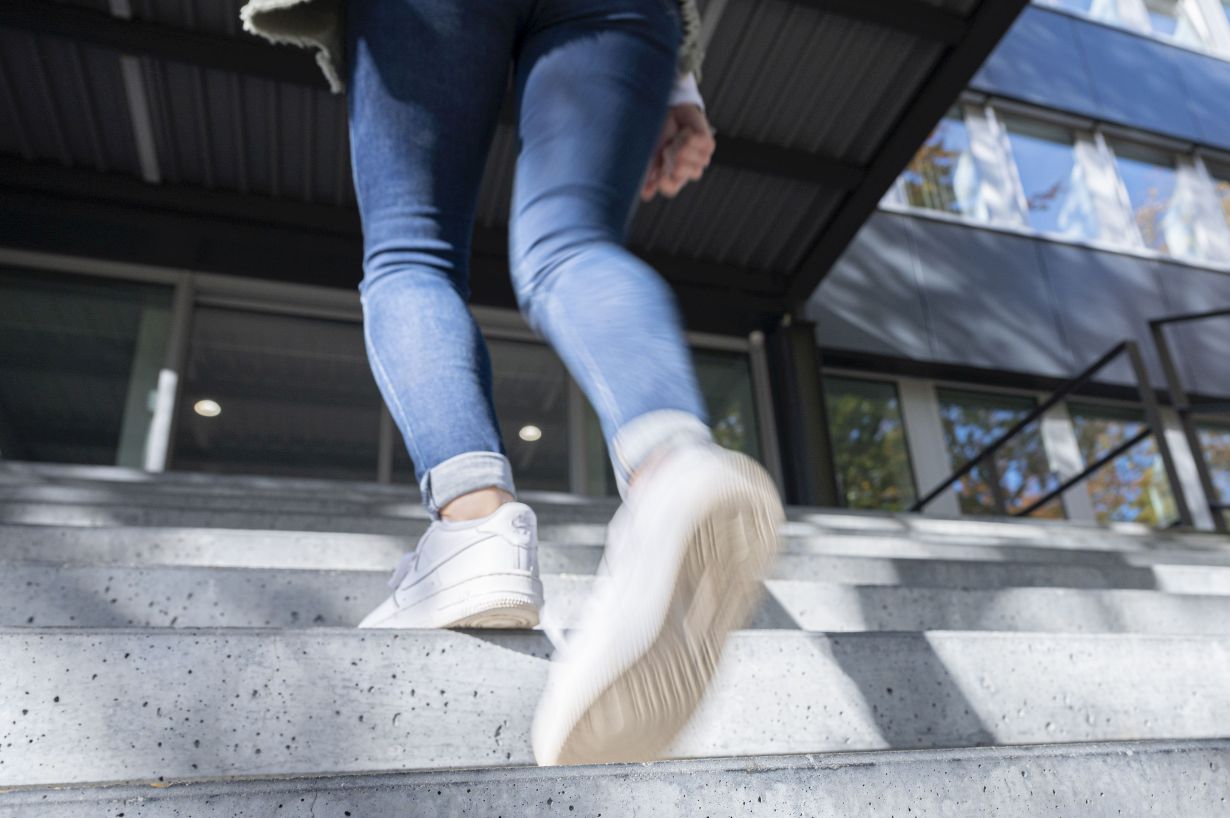Physical activity makes happy and is important to maintain psychic health. Researchers of Karlsruhe Institute of Technology (KIT) and the Central Institute of Mental Health (CIMH) in Mannheim studied the brain regions which play a central role in this process. Their findings reveal that even everyday activities, such as climbing stairs, significantly enhance well-being, in particular of persons susceptible to psychiatric disorders. The study is published in Science Advances (DOI: 10.1126/sciadv.aaz8934).
Exercise enhances physical well-being and mental health. However, impacts of everyday activities, such as climbing stairs, walking, or going to the tram station instead of driving, on a person’s mental health have hardly been studied so far. For example, it is not yet clear which brain structures are involved. A team of the Central Institute of Mental Health (CIMH) in Mannheim, KIT’s Institute of Sports and Sports Science, and the GIScience / Geoinformatics Research Group of Heidelberg University has now studied everyday activities that make up the highest share of our daily exercise. “Climbing stairs every day may help us feel awake and full of energy. This enhances well-being,” the study’s first authors explain. These are Dr. Markus Reichert who conducts research at CIMH and KIT and Dr. Urs Braun, Head of the Complex Systems Research Group of the Psychiatry and Psychotherapy Clinic of CIMH.
The research findings are of particular relevance in the current situation with Corona restrictions and the coming winter. “Currently, we are experiencing strong restrictions of public life and social contacts, which may adversely affect our well-being,” Professor Heike Tost, Head of the Systems Neuroscience Psychiatry Research Group of the Psychiatry and Psychotherapy Clinic, says. “To feel better, it may help to more often climb stairs.”
Everyday Activities Enhance Alertness and Physical Energy
“For our studies, we newly combined various research methods in everyday life and at the laboratory,” says Professor Ulrich Ebner-Priemer, Head of the mHealth Methods in Psychiatry Research Group, Deputy Head of IfSS, and Head of the Mental mHealth Lab of KIT. Among the methods used were ambulant assessments with movement sensors as well as smartphone surveys on the well-being that were triggered by geolocation data as soon as the subjects moved.
67 persons were subjected to ambulant assessments to determine the impact of everyday activity on alertness for seven days. It was found that the persons felt more alert and were bursting with even more energy directly after the activity. Alertness and energy were proved to be important components of well-being and psychic health of the participants.
Brain Regions for Everyday Activities and Well-being Identified
These analyses were combined with magnetic resonance tomography at CIMH for another group of 83 persons. The volume of gray brain matter was measured to find out which brain areas play a role in these everyday processes. It was found that the subgenual cingulate cortex, a section of the cerebral cortex, is important to the interaction between everyday activity and affective well-being. It is in this brain region where emotions and resistance to psychiatric disorders are regulated. The authors identified this brain region to be a decisive neural correlate that mediates the relationship between physical activity and subjective energy. “Persons with a smaller volume of gray brain matter in this region and a higher risk of psychiatric disorders felt less full of energy when they were physically inactive,” Heike Tost describes the results. “After everyday activity, however, these persons felt even more filled with energy than persons with a larger brain volume.”
Specific Use of Physical Activity in Everyday Life
Professor Andreas Meyer-Lindenberg, Director of CIMH and Medical Director of the Psychiatry and Psychotherapy Clinic, concludes that “the results suggest that physical activity in everyday life is beneficial to well-being, in particular in persons susceptible to psychiatric disorders.” In future, the findings of the study might be used in a smartphone app that will motivate users to be active to enhance their well-being in case of decreasing energy.” It remains to be studied whether everyday activities may change the well-being and the brain volume and how these results may help prevent and treat psychiatric disorders,” Urs Braun says.
Original publication:
Markus Reichert, Urs Braun, Gabriela Gan, Iris Reinhard, Marco Giurgiu, Ren Ma, Zhenxiang Zang, Oliver Hennig, Elena Koch, Lena Wieland, Janina Schweiger, Dragos Inta, Andreas Hoell, Ceren Akdeniz, Alexander Zipf, Ulrich Ebner-Priemer, Heike Tost, and Andreas Meyer-Lindenberg: A neural mechanism for affective well-being: Subgenual cingulate cortex mediates real-life effects of nonexercise activity on energy. Science Advances, 2020. DOI: 10.1126/sciadv.aaz8934.
Further material:
To the publication in
Science Advances: https://advances.sciencemag.org/content/6/45/eaaz8934
Being “The Research University in the Helmholtz Association”, KIT creates and imparts knowledge for the society and the environment. It is the objective to make significant contributions to the global challenges in the fields of energy, mobility, and information. For this, about 10,000 employees cooperate in a broad range of disciplines in natural sciences, engineering sciences, economics, and the humanities and social sciences. KIT prepares its 22,800 students for responsible tasks in society, industry, and science by offering research-based study programs. Innovation efforts at KIT build a bridge between important scientific findings and their application for the benefit of society, economic prosperity, and the preservation of our natural basis of life. KIT is one of the German universities of excellence.

